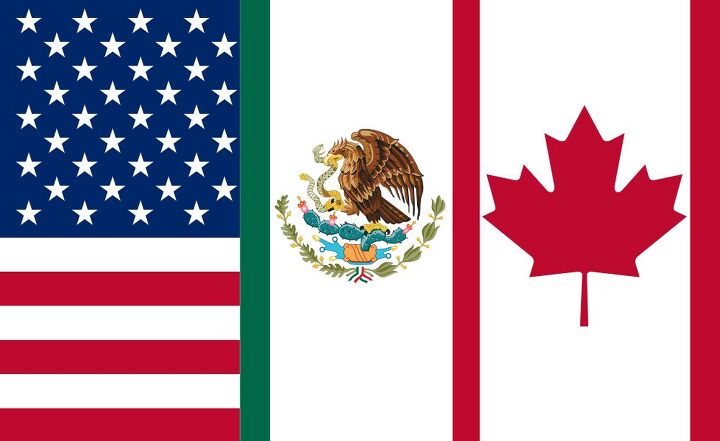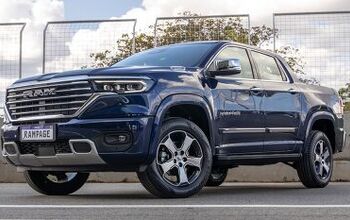NAFTA Trading Partners Agree: It's Time for a Change

Mexico and Canada are finally in agreement that NAFTA could use an update, not that the Trump administration gave them much of an opportunity to refuse renegotiations. However, after taking a critical look at the two-decade old agreement, representatives from all three nations have reached the consensus that it’s time for a change.
At Wednesday’s CAR Management Briefing Seminars, Colin Bird, minister-counselor for trade and economic policy at the Canadian Embassy, and Francisco Sandoval-Saqui, a Mexican trade official for his country’s Ministry of the Economy, laid out their country’s agendas for the NAFTA trade talks slated to begin in Washington, DC on August 16th.
Both countries are eager to make cross-border trade more fluid without handing an unfair advantage over to the United States. President Trump has previously accused NAFTA of being “the worst trade deal maybe ever signed anywhere, but certainly ever signed in this country,” and immediately moved to dismantle it upon taking office. While his stance has softened over the last few months and the reins have been handed over to Robert Lighthizer, Trump has remained bullish on the issue — claiming domestic automakers are giving away U.S. jobs and income to Canada and Mexico.
Sandoval-Saqui refuted those accusations outright, stating that NAFTA had succeeded in integrating the supply chains in the automotive industry without giving Mexico an unfair advantage. According to Automotive News, he claimed that automobiles assembled in Mexico used an average of $5,500 worth of parts made in the United States per vehicle, while cars built in the U.S. used $3,800 worth of Mexican-made parts per vehicle. “Mexican auto parts are key for U.S. auto industry competitiveness,” Sandoval-Saqui said.
Ideally, Mexico wants the negotiations to reduce tariffs and provide a smoother flow of trade between countries. “We want to look at how to reduce friction at the borders and remove regulatory framework that is not needed. That is the challenge and opportunity to do that,” he said.
Canada is hoping for the same. “We have an opportunity to look at our shared transportation infrastructure, improve our border crossings and avoid needless regulatory differences that have nothing to do with health and safety,” said Bird. “Modernizing NAFTA goes beyond a drafting exercise, and the level of high-level political attention we have on NAFTA right now is too big an opportunity; we must not squander it.”
“For Canada, it is important that we simplify and modernize the Rules of Origin, we avoid rules that are so complicated and marginal that they actually encourage production offshore. There are over 300 pages on Rules of Origin in the existing NAFTA, and that seems like a bit of excessive red tape.”
Automakers are in agreement. The industry is mainly seeking a swift and unambiguous update that doesn’t rock the boat too severely. However, if NAFTA changes in a manner that allows car manufacturers to move product between countries more easily, all the better.
Additionally, Bird stated his country hopes to see an updated NAFTA encourage small and medium-sized companies to trade across borders, bolster support to female entrepreneurs, acknowledge the economic aspirations of Canada’s indigenous communities, and ensure workers across North America see their interests reflected in the revised agreement.
Protecting workers has also been an interest within the United States, where the United Automobile Workers’ leadership, both past and present, has urged the government to be mindful of the domestic workforce. In May, former president of the UAW, Bob King, even claimed he supported the plan to reconfigure the trade agreement — provided it maintains labor’s best interests. “Workers have to be protected, our economy has to be protected, and the environment has to be protected,” King said. “NAFTA didn’t do that. If [Trump] renegotiates NAFTA to do all that, great. I’m skeptical, because everything I’ve seen him do so far is to take care of the wealthy, not to take care of the workers or the environment.”
Some of that sentiment is echoed by the White House, which explicitly stated it wants to see all countries adhering to basic workers’ rights and “establish rules to ensure that NAFTA countries do not impose measures that restrict cross-border data flows.”
However, for all the agreement, neither Mexico nor Canada want to roll over and let the United States take whatever it wants from the deal. Canadian industry groups have warned Prime Minister Justin Trudeau to be exceedingly careful not to upset the current balance and let the Trump administration steamroll its neighbor to the north.
“What I hear from the business community is for NAFTA to be trilateral,” Perrin Beatty, president and CEO of the Canadian Chamber of Commerce, told Bloomberg in a recent interview. “There are very few businesses who’d want to see stranded assets as a result of changes.”
Magna International, one of the world’s largest automotive parts suppliers, is Canadian-based but does an equal share of business in all three member nations — and is wary of sudden changes to the accord. While CEO Don Walker believes updating NAFTA could benefit the automotive industry, he’s worried about alterations to the Rules of Origin.
“A change to one element of the rule could have a cascading effect on other rules that may result in unintended consequences,” Walker said.
Canada’s Automotive Parts Manufacturers’ Association concurred, suggesting that any level of protectionist policy taken by any of the three countries could be detrimental to the industry as a whole.
[Image: NAFTA Secretariat]

A staunch consumer advocate tracking industry trends and regulation. Before joining TTAC, Matt spent a decade working for marketing and research firms based in NYC. Clients included several of the world’s largest automakers, global tire brands, and aftermarket part suppliers. Dissatisfied with the corporate world and resentful of having to wear suits everyday, he pivoted to writing about cars. Since then, that man has become an ardent supporter of the right-to-repair movement, been interviewed on the auto industry by national radio broadcasts, driven more rental cars than anyone ever should, participated in amateur rallying events, and received the requisite minimum training as sanctioned by the SCCA. Handy with a wrench, Matt grew up surrounded by Detroit auto workers and managed to get a pizza delivery job before he was legally eligible. He later found himself driving box trucks through Manhattan, guaranteeing future sympathy for actual truckers. He continues to conduct research pertaining to the automotive sector as an independent contractor and has since moved back to his native Michigan, closer to where the cars are born. A contrarian, Matt claims to prefer understeer — stating that front and all-wheel drive vehicles cater best to his driving style.
More by Matt Posky
Latest Car Reviews
Read moreLatest Product Reviews
Read moreRecent Comments
- MaintenanceCosts Poorly packaged, oddly proportioned small CUV with an unrefined hybrid powertrain and a luxury-market price? Who wouldn't want it?
- MaintenanceCosts Who knows whether it rides or handles acceptably or whether it chews up a set of tires in 5000 miles, but we definitely know it has a "mature stance."Sounds like JUST the kind of previous owner you'd want…
- 28-Cars-Later Nissan will be very fortunate to not be in the Japanese equivalent of Chapter 11 reorganization over the next 36 months, "getting rolling" is a luxury (also, I see what you did there).
- MaintenanceCosts RAM! RAM! RAM! ...... the child in the crosswalk that you can't see over the hood of this factory-lifted beast.
- 3-On-The-Tree Yes all the Older Land Cruiser’s and samurai’s have gone up here as well. I’ve taken both vehicle ps on some pretty rough roads exploring old mine shafts etc. I bought mine right before I deployed back in 08 and got it for $4000 and also bought another that is non running for parts, got a complete engine, drive train. The mice love it unfortunately.


































Comments
Join the conversation
Lest we all get into a p!ssing match over republican versus democrat - we've got both parties selling us out. Yes, I understand the arguments for free trade - in theory they're all very strong, reasonable arguments. However, like anyone who says that "in theory Socialism works", they're completely disconnected with reality. Same goes for those who believe in completely unfettered capitalism: they're forgetting that big component known as "human nature". Socialism only works when you force or steal others' labor and unfettered capitalism, by its nature, allows the fox to run loose in the henhouse. NAFTA has helped manufacturers lower labor costs and has opened up some markets for US products. It's very hard to explain that to anyone who works in an Ohio manufacturing plant who lost their job when the factory was moved to Mexico. I have a problem with any trade deal that allows someone to take advantage of environmental or labor law arbitrage. Free trade with Europe or Canada - sure. We've got relatively similar value placed on the importance of health/safety/labor and environmental laws. Unfettered trade with Mexico and China ignores the major disparity in values between our nations and leads to unfair trade. It's immoral and unfair for us to preach labor and environmental safety here, but it's okay to allow offshored production to pollute and abuse so long as it's not within our borders.
Right after the bill was signed Jesse Jackson went in front of the cameras and screamed "NAFTA is a SHAFTA!". It was a great movie too.